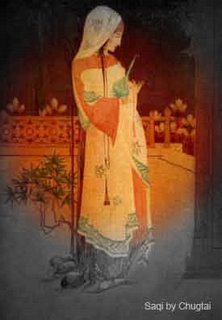4. The Razzle Dazzle Ghazal, or Should We Muzzle the Gazelle?
 Ghazal (Arabic, pron. ghhuzzle): Ghazal means ''boy-girl talk," chatting with women, talking with the Beloved. The ghazal has evolved resonant meanings from the profane to the sacred. Used as a verb it means to 'flirt with', which accords well with the playful nature of the form which is amatory in nature. The plural form is ghazaliat (as in Ghazaliat-e-Hafez, Sadi, Molavi..). One can also use the Farsi plural rule (even on non-Farsi words) by adding "haa at the end of the word (ghazal-haa). In Urdu the ending 'haa' is nasalised. But both forms are less common. However, ghazal in Arabic may have started out as gazaal.
Ghazal (Arabic, pron. ghhuzzle): Ghazal means ''boy-girl talk," chatting with women, talking with the Beloved. The ghazal has evolved resonant meanings from the profane to the sacred. Used as a verb it means to 'flirt with', which accords well with the playful nature of the form which is amatory in nature. The plural form is ghazaliat (as in Ghazaliat-e-Hafez, Sadi, Molavi..). One can also use the Farsi plural rule (even on non-Farsi words) by adding "haa at the end of the word (ghazal-haa). In Urdu the ending 'haa' is nasalised. But both forms are less common. However, ghazal in Arabic may have started out as gazaal. There also appears to be a relationship between the word ghazal and gazelle. According to Dr. Basiel Wolde Gabriel, from the Ethiopian Distance learning Association: "There are numerous types of antelopes in Ethiopia often called agazzen or yemeda ffiyel. In fact the derivation of the word gazelle can well be attributed to the Ethiopian word agazzen from which the Arabs borrowed and called the goat-like animals ghazal. In 'Ravishing Disunities: Real Ghazals in English", Agha Shahid Ali claims that ghazal in Persian also means "the cry of the gazelle when it is cornered in a hunt and knows it will die," but he does not quote any source to substantiate this elegant assertion. In his posthumous ghazal collection 'Call Me Ishmael Tonight' (Norton) he has written:
The hunt is over, and I hear the Call to Prayer
fade into that of the wounded gazelle tonight. ("Tonight, p 82)
Without being too pedogical about it "ghazal" and "gazelle" (a form of deer) do seem to have some etymological tie-up. One can only conjecture (in an interpretive sense) what the word "deer" might have to do with "romantic" verse. Well, a close look at the use of the word "Maan" in Tamizh, in both native mythology and contemporary literature, will reveal only the obvious: The grace of the deer. Maanvizhi, Ilamaan, Maanottam/nadai, - it is all about poise, attraction and fragility. That is the heart of the ghazal too. deer/dear might also be another aural coincidence ( or not?).
A unamed reviewer in Lynx, XVI:3, October 2001 believes ''this ties the pronunciation to ‘gay-zel'" which is one the ways that Westerners often pronounce the word. The reviewer cites American poet Robert Bly as a famous example, although Perhaps regional differences in pronunciation and the changing morphology of words as they travel from culture to culture will make it difficult for Western audiences to settle on a pronunciation. The soft 'ghh' at the beginning of the word is closer to French 'r' from deep in the throat, except that the ghh is pronounced on the back of the tongue as if (to put it graphically) coughing up phelgm.
This minor controversy about pronunciation has arisen from the difficulty English-speakers have with the traditional sounds, not found in this language. The rather rough approximation of 'guzzle' sounds more like quaffing beer than savouring the fine wine of Eastern poetry, thus Western tongues looking for a more 'refined' sounding word to match their idea of the form mostly opt for 'gay-zel', 'guh-zaal' or 'g'zaal', both which says more about the confusion felt by English-language speakers of the word, compared with the typical pronunciation of the word in say Farsi or Urdu.
A unamed reviewer in Lynx, XVI:3, October 2001 believes ''this ties the pronunciation to ‘gay-zel'" which is one the ways that Westerners often pronounce the word. The reviewer cites American poet Robert Bly as a famous example, although Perhaps regional differences in pronunciation and the changing morphology of words as they travel from culture to culture will make it difficult for Western audiences to settle on a pronunciation. The soft 'ghh' at the beginning of the word is closer to French 'r' from deep in the throat, except that the ghh is pronounced on the back of the tongue as if (to put it graphically) coughing up phelgm.
This minor controversy about pronunciation has arisen from the difficulty English-speakers have with the traditional sounds, not found in this language. The rather rough approximation of 'guzzle' sounds more like quaffing beer than savouring the fine wine of Eastern poetry, thus Western tongues looking for a more 'refined' sounding word to match their idea of the form mostly opt for 'gay-zel', 'guh-zaal' or 'g'zaal', both which says more about the confusion felt by English-language speakers of the word, compared with the typical pronunciation of the word in say Farsi or Urdu.


